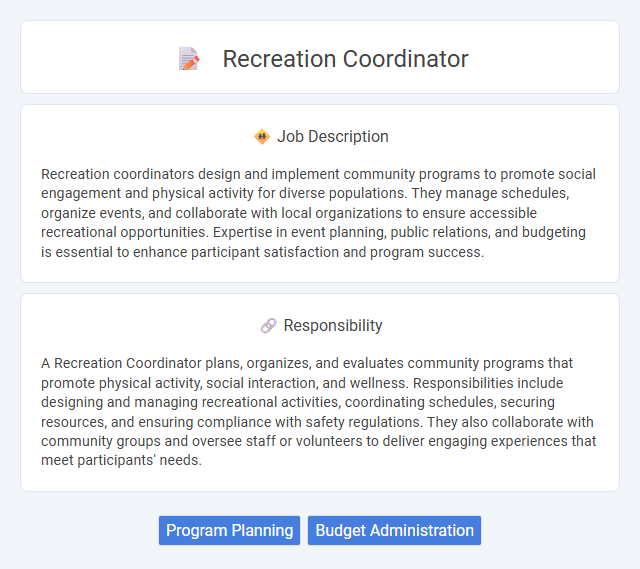
Recreation coordinators design and implement community programs to promote social engagement and physical activity for diverse populations. They manage schedules, organize events, and collaborate with local organizations to ensure accessible recreational opportunities. Expertise in event planning, public relations, and budgeting is essential to enhance participant satisfaction and program success.
Individuals who are empathetic, patient, and possess strong interpersonal skills are likely to be well-suited for a Recreation Coordinator role, as the job requires organizing activities that accommodate diverse needs and abilities. Those comfortable working with various age groups and individuals with physical or cognitive challenges may find greater success and satisfaction in this position. Candidates who thrive in dynamic environments and can adapt to changing participant conditions probably fit this job scenario best.
Qualification
A Recreation Coordinator typically requires a bachelor's degree in recreation management, physical education, or a related field along with CPR and first aid certifications. Strong organizational, communication, and leadership skills are essential for planning and overseeing community programs, events, and activities. Experience with budgeting, staff supervision, and knowledge of health and safety regulations further enhances job performance.
Responsibility
A Recreation Coordinator plans, organizes, and evaluates community programs that promote physical activity, social interaction, and wellness. Responsibilities include designing and managing recreational activities, coordinating schedules, securing resources, and ensuring compliance with safety regulations. They also collaborate with community groups and oversee staff or volunteers to deliver engaging experiences that meet participants' needs.
Benefit
Recreation coordinators likely enjoy the benefit of fostering community engagement and promoting healthy lifestyles through organized activities. They may experience job satisfaction from creating inclusive programs that cater to diverse age groups and abilities. The role probably offers opportunities for professional growth in event management and leadership within the recreational industry.
Challenge
Recreation coordinator roles frequently involve the challenge of balancing diverse participant interests while managing limited resources and strict budgets. Navigating unexpected changes in schedules or weather conditions may also test adaptability and problem-solving skills. Success in this position likely depends on maintaining motivation and communication across teams to ensure seamless event execution.
Career Advancement
Recreation coordinators manage and develop community programs that promote physical activity, social interaction, and cultural enrichment, positioning themselves as essential leaders in the leisure industry. Career advancement often involves moving into senior management roles such as recreation director, program manager, or facility supervisor, which require enhanced skills in budgeting, staff oversight, and strategic planning. Obtaining certifications like Certified Park and Recreation Professional (CPRP) and gaining experience in diverse community settings significantly improve prospects for promotion and higher salary opportunities.
Key Terms
Program Planning
Recreation coordinators specialize in program planning by designing, organizing, and implementing diverse recreational activities that promote physical, social, and cultural development. They conduct needs assessments, allocate resources, and coordinate with community partners to ensure programs align with target audience interests and organizational goals. Effective program planning in this role enhances participant engagement, maximizes facility usage, and supports overall community well-being.
Budget Administration
Recreation coordinators oversee budget administration by preparing, managing, and monitoring financial plans for community programs and facilities. They allocate funds efficiently to ensure resources support diverse recreational activities while maintaining compliance with fiscal policies. Effective budget administration enables coordinators to optimize program quality and maximize public engagement within allocated financial constraints.
 kuljobs.com
kuljobs.com